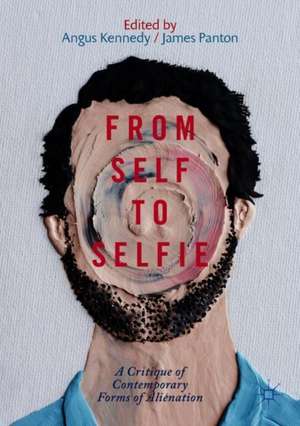From Self to Selfie: A Critique of Contemporary Forms of Alienation
Editat de Angus Kennedy, James Pantonen Limba Engleză Paperback – 19 aug 2019
Tracing the trajectory of selfhood in its historical development - from the Reformation onwards - the authors introduce the classic liberal account of the self, based on ideas of freedom and autonomy, that dominated Enlightenment discourse. Subsequent chapters explore whether this traditional notion has been eclipsed by new, more rigid, categories of identity, that alienate the self from itself and its possibilities: what I am, it seems, has become more important than what I might make of myself.
These changing dynamics of selfhood – the transition From Self to Selfie - reveal not only the peculiar ways in which selfhood is problematized in contemporary society, but equally the tragic fragility of the selfie, in the absence of any social authority that could give it some security.
Preț: 146.36 lei
Nou
28.01€ • 29.13$ • 23.12£
Carte disponibilă
Livrare economică 24 martie-07 aprilie
Specificații
ISBN-10: 3030191931
Pagini: 258
Ilustrații: XVII, 228 p. 1 illus.
Dimensiuni: 148 x 210 x 14 mm
Greutate: 0.3 kg
Ediția:1st ed. 2019
Editura: Springer International Publishing
Colecția Palgrave Macmillan
Locul publicării:Cham, Switzerland
Cuprins
Part 1.- 1. Introduction: Classical and Contemporary Forms of Alienation; James Panton.- 2. The Emergence of the Self in History; Frank Furedi.- 3. In Praise of Selfish Individualism; Jamie Whyte. 4. Self-Enlightenment; Angus Kennedy.- 5. 'Of Individuality, as One of the Elements of Wellbeing.' J.S. Mill and the Nineteenth-Century Liberal Individual; James Panton.- 6. The Rise and Fall of the Rule of Law; Jon Holbrook.- Part 2.- 7. Autonomy and the Birth of Authenticity; Tim Black.- 8. Self, Society, Alienation: From Marx to Identity Politics; Josie Appleton.- 9.. Anti-Humanism and the Deconstruction of the Liberal Subject; James Heartfield.- 10. Narcissism and Identity; Claire Fox.- 11. New Forms of Alienation; Frank Furedi.- 12. Conclusion: The Self and Its Prospects; Angus Kennedy.
Notă biografică
Angus Kennedy is Convenor of the Battle of Ideas (boi) educational initiative, The Academy.
James Panton is Associate Lecturer in Philosophy at the Open University, and Head of Politics at Magdalen College School in Oxford, UK.
Textul de pe ultima copertă
This edited collection charts the rise and the fall of the self, from its emergence as an autonomous agent during the Enlightenment, to the modern-day selfie self, whose existence is realised only through continuous external validation.
Tracing the trajectory of selfhood in its historical development - from the Reformation onwards - the authors introduce the classic liberal account of the self, based on ideas of freedom and autonomy, that dominated Enlightenment discourse. Subsequent chapters explore whether this traditional notion has been eclipsed by new, more rigid, categories of identity, that alienate the self from itself and its possibilities: what I am, it seems, has become more important than what I might make of myself.
These changing dynamics of selfhood – the transition From Self to Selfie - reveal not only the peculiar ways in which selfhood is problematized in contemporary society, but equally the tragic fragility of the selfie, in the absence of any social authority that could give it some security.
Caracteristici
Opens up a much needed discussion on an area that has recently been largely neglected, but clearly requires renewed reflection given the nature of and the pace of current transformations of subjectivity in public and private life
Brings together a mutlidisciplinary collection of high profile academics and social commentators
Descriere
This edited collection charts the rise and the fall of the self, from its emergence as an autonomous agent during the Enlightenment, to the modern-day selfie self, whose existence is realised only through continuous external validation.
Tracing the trajectory of selfhood in its historical development - from the Reformation onwards - the authors introduce the classic liberal account of the self, based on ideas of freedom and autonomy, that dominated Enlightenment discourse. Subsequent chapters explore whether this traditional notion has been eclipsed by new, more rigid, categories of identity, that alienate the self from itself and its possibilities: what I am, it seems, has become more important than what I might make of myself.
These changing dynamics of selfhood – the transition From Self to Selfie - reveal not only the peculiar ways in which selfhood is problematized in contemporary society, but equally the tragic fragility of the selfie, in the absence of any social authority that could give it some security.
